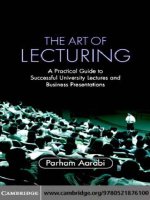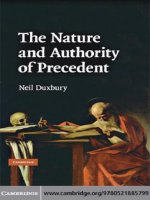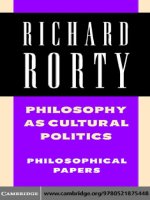cambridge university press philosophy as cultural politics philosophical papers jan 2007 kho tài liệu bách khoa
Bạn đang xem bản rút gọn của tài liệu. Xem và tải ngay bản đầy đủ của tài liệu tại đây (1.72 MB, 219 trang )
PHILOSOPHY AS CULTURAL POLITICS
This volume presents a selection of the philosophical papers which
Richard Rorty has written over the past decade, and complements
three previous volumes of his papers: Objectivity, Relativism, and
Truth, Essays on Heidegger and Others, and Truth and Progress. Topics
discussed include the changing role of philosophy in Western culture
over the course of recent centuries, the role of the imagination in intellectual and moral progress, the notion of “moral identity,” the
Wittgensteinian claim that the problems of philosophy are linguistic
in nature, the irrelevance of cognitive science to philosophy, and the
mistaken idea that philosophers should find the “place” of such things
as consciousness and moral value in a world of physical particles. The
papers form a rich and distinctive collection which will appeal to
anyone with a serious interest in philosophy and its relation to culture.
PHILOSOPHY AS
CULTURAL POLITICS
Philosophical Papers, Volume 4
RICHARD RORT Y
CAMBRIDGE UNIVERSITY PRESS
Cambridge, New York, Melbourne, Madrid, Cape Town, Singapore, São Paulo
Cambridge University Press
The Edinburgh Building, Cambridge CB2 8RU, UK
Published in the United States of America by Cambridge University Press, New York
www.cambridge.org
Information on this title: www.cambridge.org/9780521875448
© R i c h a r d R o r t y 2007
This publication is in copyright. Subject to statutory exception and to the provision of
relevant collective licensing agreements, no reproduction of any part may take place
without the written permission of Cambridge University Press.
First published in print format 2007
ISBN-13
ISBN-10
978-0-511-26989-9 eBook (MyiLibrary)
0-511-26989-7 eBook (MyiLibrary)
ISBN-13
ISBN-10
978-0-521-87544-8 hardback
0-521-87544-7 hardback
ISBN-13
ISBN-10
978-0-521-69835-1 paperback
0-521-69835-9 paperback
Cambridge University Press has no responsibility for the persistence or accuracy of urls
for external or third-party internet websites referred to in this publication, and does not
guarantee that any content on such websites is, or will remain, accurate or appropriate.
To Ruby Rorty, Flynn Rorty, and other grandchildren still to come
Contents
Preface
Acknowledgments
page ix
xi
Cultural politics and the question of the existence of God
Pragmatism as romantic polytheism
Justice as a larger loyalty
Honest mistakes
’
Grandeur, profundity, and finitude
Philosophy as a transitional genre
Pragmatism and romanticism
Analytic and conversational philosophy
A pragmatist view of contemporary analytic philosophy
Naturalism and quietism
Wittgenstein and the linguistic turn
Holism and historicism
Kant vs. Dewey: the current situation of moral philosophy
Index of names
vii
Preface
Most of the papers collected in this volume were written between and
. Like my previous writings, they are attempts to weave together
Hegel’s thesis that philosophy is its time held in thought with a nonrepresentationalist account of language. That account, implicit in the later
work of Wittgenstein, has been more carefully worked out in the writings
of Wilfrid Sellars, Donald Davidson, and Robert Brandom. I argue that
Hegelian historicism and a Wittgensteinian “social practice” approach to
language complement and reinforce one another.
Dewey agreed with Hegel that philosophers were never going to be able
to see things under the aspect of eternity; they should instead try to contribute to humanity’s ongoing conversation about what to do with itself.
The progress of this conversation has engendered new social practices, and
changes in the vocabularies deployed in moral and political deliberation.
To suggest further novelties is to intervene in cultural politics. Dewey
hoped that philosophy professors would see such intervention as their
principal assignment.
In Dewey’s work, historicism appears as a corollary of the pragmatist
maxim that what makes no difference to practice should make no difference to philosophy. “Philosophy,” Dewey wrote, “is not in any sense whatever a form of knowledge.” It is, instead, “a social hope reduced to a
working program of action, a prophecy of the future.” From Dewey’s point
of view, the history of philosophy is best seen as a series of efforts to modify
people’s sense of who they are, what matters to them, what is most important.
Interventions in cultural politics have sometimes taken the form of proposals for new roles that men and women might play: the ascetic, the
prophet, the dispassionate seeker after truth, the good citizen, the aesthete,
John Dewey, “Philosophy and Democracy,” in The Middle Works, ed. Jo Ann Boydston (Carbondale:
Southern Illinois University Press, ), vol. XI, .
ix
x
Prelims
the revolutionary. Sometimes they have been sketches of an ideal community – the perfected Greek polis, the Christian Church, the republic of
letters, the cooperative commonwealth. Sometimes they have been suggestions about how to reconcile seemingly incompatible outlooks – to resolve
the conflict between Greek rationalism and Christian faith, or between
natural science and the common moral consciousness. These are just a few
of the ways in which philosophers, poets, and other intellectuals have made
a difference to the way human beings live.
In many of these papers, I urge that we look at relatively specialized and
technical debates between contemporary philosophers in the light of our
hopes for cultural change. Philosophers should choose sides in those
debates with an eye to the possibility of changing the course of the conversation. They should ask themselves whether taking one side rather than
another will make any difference to social hopes, programs of action,
prophecies of a better future. If it will not, it may not be worth doing. If it
will, they should spell out what that difference amounts to.
The professionalization of philosophy, its transformation into an academic discipline, was a necessary evil. But it has encouraged attempts to make
philosophy into an autonomous quasi-science. These attempts should be
resisted. The more philosophy interacts with other human activities – not
just natural science, but art, literature, religion and politics as well – the
more relevant to cultural politics it becomes, and thus the more useful. The
more it strives for autonomy, the less attention it deserves.
Readers of my previous books will find little new in this volume. It contains no novel ideas or arguments. But I hope that these further efforts to
tie James’ and Dewey’s ideas up with Hegel’s and Wittgenstein’s may lead
a few readers to think of pragmatism in a more favorable light. In an exuberant moment, James compared pragmatism’s potential for producing
radical cultural change to that of the Protestant Reformation. I would like
to persuade my readers that the analogy is not as absurd as it might seem.
Letter to Henry James, Jr. of May , , in The Correspondence of William James, vol. XI, ed. Ignas
K. Skrupskelis and Elizabeth M. Berkeley (Charlottesville: University Press of Virginia, ).
Acknowledgments
“Cultural politics and the question of the existence of God” was published
in Radical Interpretation in Religion, ed. Nancy Frankenberry (Cambridge
University Press, ).
“Pragmatism as romantic polytheism” was published in The Revival of
Pragmatism: New Essays on Social Thought, Law and Culture, ed. Morris
Dickstein (Duke University Press, ).
“Justice as a larger loyalty” was written for the Seventh East–West
Philosophy Conference and was first published in Justice and Democracy:
Cross-Cultural Perspectives, ed. Ron Bontekoe and Marietta Stepaniants
(University of Hawaii Press, ).
“Honest mistakes” was written for a conference on “The Cold War” organized in by Louis Menand for the English Institute. Under the title
“Whittaker Chambers and Alger Hiss: Two Men of Honor,” the paper is
forthcoming in the Proceedings of the English Institute.
“Grandeur, profundity, and finitude” is a revised version of the first of two
Smythies Lectures given at Balliol College, Oxford, in . An earlier
version was read at a UNESCO conference in Benin and published as
“Universalist Grandeur, Romantic Depth, Pragmatist Cunning” in
Diogenes, no. .
“Philosophy as a transitional genre” is a shortened and revised version of
an essay published under the same title in Pragmatism, Critique, Judgment:
Essays for Richard J. Bernstein, ed. Seyla Benhabib and Nancy Fraser (MIT
Press, ).
“Pragmatism and romanticism” was the third of three Page-Barbour
Lectures given at the University of Virginia in . It has not been published previously.
xi
xii
Acknowledgments
“Analytic and conversational philosophy” is a revised version of a paper
published, under the same title, in A House Divided: Comparing Analytic
and Continental Philosophy, ed. Carlos Prado (Humanties Press, ).
“A pragmatist view of contemporary analytic philosophy” was published,
under the same title, in The Pragmatic Turn in Philosophy: Contemporary
Engagements between Analytic and Continental Thought, ed. William
Egginton and Mike Sandbothe (State University of New York Press, ).
“Naturalism and quietism” has not been published previously.
“Wittgenstein and the linguistic turn” was written in response to an invitation from the Kirchberg Wittgenstein Symposium. It has not been published previously.
“Holism and historicism” is a revised and shortened version of the second
of two Smythies Lectures at Oxford; an earlier version was published in
Kant im Streit der Fakultaeten, ed. Volker Gerhardt (De Gruyter, ).
“Kant vs. Dewey: the current situation of moral philosophy” was published
under the title “Trapped between Kant and Dewey: The Current Situation
of Moral Philosophy,” in New Essays on the History of Autonomy: A
Collection Honoring J. B. Schneewind, ed. Natalie Brender and Larry
Krasnoff (Cambridge University Press, ).
I am very grateful to the institutions mentioned above for their invitations
to give lectures or to contribute to symposia. These invitations led me to
write on various topics I should otherwise not have discussed. I also appreciate the willingness of the publishers I have listed to let me include previously published papers in this volume.
I also want to thank Gideon Lewis-Kraus, my former research assistant at
Stanford, for indispensable assistance in preparing this volume for publication. He gave me excellent advice about which papers to include, which
to omit, and which to revise. He also did most of the work of seeing it
through the press.
xii
Religion and Morality from a Pragmatist
Point of View
Cultural politics and the question of the
existence of God
The term “cultural politics” covers, among other things, arguments
about what words to use. When we say that Frenchmen should stop referring to Germans as “Boches,” or that white people should stop referring to
black people as “niggers,” we are practicing cultural politics. For our sociopolitical goals – increasing the degree of tolerance that certain groups of
people have for one another – will be promoted by abandoning these linguistic practices.
Cultural politics is not confined to debates about hate speech. It includes
projects for getting rid of whole topics of discourse. It is often said, for
example, that we should stop using the concepts of “race” and “caste,” stop
dividing the human community up by genealogical descent. The idea is to
lessen the chances that the question “who are his or her ancestors?” will be
asked. Many people urge that words like “noble blood,” “mixed blood,”
“outcaste,” “intermarriage,” “untouchable,” and the like should be dropped
from the language. For, they argue, this would be a better world if the suitability of people as spouses or employees or public officials were judged
entirely on the basis of their behavior, rather than partially by reference to
their ancestry.
This line of thinking is sometimes countered by saying “but there really
are inherited differences – ancestry does matter.” The rejoinder is: there certainly are inheritable physical characteristics, but these do not, in themselves, correlate with any characteristics that could provide a good reason
for breaking up a planned marriage, or voting for or against a candidate.
We may need the notion of genetic transmission for medical purposes, but
not for any other purposes. So instead of talking about different races, let
us just talk about different genes.
In the case of “race,” as in that of “noble blood,” the question “is there
such a thing?” and the question “should we talk about such a thing?” seem
Philosophy as Cultural Politics
pretty well interchangeable. That is why we tend to classify discussion of
whether to stop talking about different races as “political” rather than “scientific” or “philosophical.” But there are other cases in which it seems odd
to identify questions about what exists with questions about what it is
desirable to discuss.
The question of whether to talk about neutrons, for example, seems a
strictly scientific question. That is why people who regret that physicists
ever investigated radioactivity, or speculated about the possibility of splitting the atom, are accused of confusing science with politics. It seems
natural to separate the political question of whether it was a good thing for
humanity that scientists began to think about the possibility of atomic
fission from scientific questions about the existence and properties of elementary particles.
I have sketched this contrast between the case of races and that of neutrons because it raises the question I want to discuss: how do we tell when,
if ever, an issue about what exists should be discussed without reference to
our sociopolitical goals? How should we split up culture into areas to which
cultural politics is relevant and areas which should be kept free of it? When
is it appropriate to say “we had better talk about them, because they exist”
and when is that remark not to the point?
These questions are important for debates about what roles religion
should play in contemporary society. Many people think that we should
just stop talking about God. They think this for much the same reasons
that they believe talk of race and caste to be a bad thing. Lucretius’ Tantum
religio potuit suadere malorum has been quoted for two millennia in order
to remind us that religious conviction can easily be used to excuse cruelty.
Marx’s claim that religion is the opiate of the people sums up the suspicion,
widespread since the Enlightenment, that ecclesiastical institutions are
among the principal obstacles to the formation of a global cooperative
commonwealth. Many people agree with Marx that we should try to create
a world in which human beings devote all their energies to increasing
human happiness in this world, rather than taking time off to think about
the possibility of life after death.
To say that talk about God should be dropped because it impedes the
search for human happiness is to take a pragmatic attitude toward religion
that many religious believers find offensive and that some theologians
think beside the point. The point, they would insist, is that God exists, or
perhaps that human beings really do have immortal souls. Granted that the
existence of God or of an immortal soul is controversial, that controversy
should be explicitly about what exists, not about whether religious belief
Cultural politics and God
conduces to human happiness. First things first: ontology precedes cultural
politics.
’
I want to argue that cultural politics should replace ontology, and also that
whether it should or not is itself a matter of cultural politics. Before turning
to the defense of these theses, however, I want to underline the importance
of such issues for philosophers who, like myself, are sympathetic to William
James’ pragmatism. James agreed with John Stuart Mill that the right thing
to do, and a fortiori the right belief to acquire, is always the one that will
do most for human happiness. So he advocated a utilitarian ethics of belief.
James often comes close to saying that all questions, including questions
about what exists, boil down to questions about what will help create a
better world.
James’ willingness to say this sort of thing has made him subject to accusations of intellectual perversity. For his view seems to suggest that, when
notions like “race-mixing” and “atomic fission” are brought into the conversation, it is apposite to exclaim: “Let’s not talk about that sort of thing!
It’s too dangerous! Let’s not go there!” James seems to countenance doing
what Peirce forbade: blocking the road of inquiry, refusing to find out what
the world is really like because doing so might have harmful effects on
human beings.
To give a concrete example, many people have argued that psychologists should not try to find out whether inheritable physical features are
correlated with intelligence, simply because of the social harm that a
positive answer to this question might produce. James’ view of truth
seems to suggest that these people are making a good point. People who
are suspicious of pragmatism, on the other hand, argue that preventing
scientists from doing experiments to find out whether intelligence is
genetically transmissible, or to find out whether a neutron bomb is feasible, is to sin against truth. On their view, we should separate practical
questions about whether eugenics or racial discrimination should be practiced, from the straightforwardly empirical question about whether
Europeans are, on average, stupider than Asiatics – just as we divide the
question of whether we can build a neutron bomb from the question of
whether we should.
James was criticized not only for blocking the road of inquiry, and thus
for being too restrictive, but also for being too permissive. That criticism
was most frequently directed at “The Will to Believe,” an essay which he
Philosophy as Cultural Politics
said should have been titled “The Right to Believe.” There he argued that
one had a right to believe in the existence of God if that belief contributed
to one’s happiness, for no reason other than that very contribution.
I think that the best way for those of us who find James’ pragmatism
sympathetic to restate his position is to say that questions about what is too
permissive and what is too restrictive are themselves questions of cultural
politics. For example, the question of whether religious believers should be
asked for evidence of the truth of their belief, and condemned as uneducated or irrational if they are unable to produce sufficient evidence, is a
question about what sort of role we want religion to play in our society. It
is on all fours with the question raised by the Inquisition: should scientists
be allowed cavalierly to disregard scripture when they formulate hypotheses about the motions of heavenly bodies?
The question of whether we should, for the sake of preserving ancient
traditions, allow parents to perpetuate a caste system by dictating choices
of marriage partners to their children, is the same sort of question. Such
questions arise whenever new social practices are beginning to compete
with old ones – when, for example, the New Science of seventeenthcentury Europe began to compete with the Christian churches for control
of the universities, or when a traditional African culture is exposed to
European ways.
The question of whether scientists should have been allowed to find out
whether the atom could be split, or should be allowed to investigate the
correlation of intelligence with skin color, is not a question that can be
answered simply by saying “do not block the road of inquiry!” or “seek the
truth, though the heavens fall!” Neither is the question of whether France
and Germany are right to criminalize Holocaust-denial. There is much to
be said on both sides. The argument for letting scientists investigate whatever they please is that the more ability to predict we can get, the better off
we shall be in the long run. The argument for blocking them off from
certain topics is that the short-run dangers are so great as to outweigh the
chances of long-term benefit. There are no grand philosophical principles
that can help us solve such problems of risk-management.
To say that James is basically right in his approach to truth and reality is
to say that arguments about relative dangers and benefits are the only ones
that matter. That is why the statement “we should be talking about it
because it’s real” is as useless as “we should believe it because it’s true.”
Attributions of reality or truth are, on the view I share with James, compliments we pay to entities or beliefs that have won their spurs, paid their
way, proved themselves useful, and therefore been incorporated into
Cultural politics and God
accepted social practices. When these practices are being contested, it is of
no use to say that reality or truth is on the side of one of the contestants.
For such claims will always be mere table-thumping, not serious contributions to cultural politics.
Another way to put James’ point is to say that truth and reality exist for
the sake of social practices, rather than vice versa. Like the Sabbath, they
are made for man. This is a dark saying, but I think that it can be defended
by appealing to the work of a contemporary neo-Hegelian, Robert
Brandom, whose writings provide the best weapons for defending my
version of James’ pragmatism. Brandom is not a utilitarian, and his work
follows out the line of thought that leads from Kant to Hegel, rather than
the one that leads from Mill to James. But his construal of assertions as the
assumption of responsibilities to other members of society, rather than to
“the world” or “the truth,” brings him into alignment with James.
The germ of Brandom’s later work can be found in an early article he published on Heidegger. There he treats Heidegger as putting forward a doctrine he calls “the ontological priority of the social.” The doctrine of the
priority of the social is perhaps not happily thought of as an “ontological”
one, but Brandom is using it as a way of explicating the consequences of
Heidegger’s quasi-pragmatist attempt to make the Zuhanden prior to the
Vorhanden. The priority in question consists in the fact that “all matters of
authority or privilege, in particular epistemic authority, are matters of social
practice, and not objective matters of fact.”
Brandom enlarges on this claim by remarking that society divides
culture up into three areas. In the first of these the individual’s authority
is supreme (as when she makes sincere first-person reports of feelings or
thoughts). In the second, the non-human world is supreme (as when the
litmus paper, or the DNA-analysis apparatus, is allowed to determine
whether the accused will be freed or punished, or whether a given scientific theory will be accepted or rejected). But there is a third area in which
society does not delegate, but retains the right to decide for itself. This last
is the arena of cultural politics. Brandom analogizes this situation to the
constitutional arrangements of the USA, according to which, as he says,
“the judiciary is given the authority and responsibility to interpret the
proper region of authority and responsibility of each branch [that is to say,
Robert Brandom, “Heidegger’s Categories in Being and Time,” The Monist (), –.
Philosophy as Cultural Politics
of the executive, the legislative, and the judiciary branches of government],
itself included.”
The question at issue between James and his opponents boiled down to
this: is there an authority beyond that of society which society should
acknowledge – an authority such as God, or Truth, or Reality? Brandom’s
account of assertions as assumptions of social responsibilities leaves no room
for such an authority, and so he sides with James. Both philosophers can
appeal to Occam’s Razor. The authority traditionally attributed to the nonhuman can be explained sociologically, and such a sociological account has
no need to invoke the rather mysterious beings that theological or philosophical treatments of authority require. (Such entities include “the divine
will,” “the intrinsic nature of reality, as it is in itself, apart from human needs
and interests,” and “the immediately given character of experience.”)
Suppose that one accepts the thesis of the ontological primacy of the
social. Then one will think that the question of the existence of God is a
question of the advantages and disadvantages of using God-talk over
against alternative ways of talking. As with “race,” so with “God.” Instead
of taking about races we can, for many purposes, talk about genes. Instead
of talking about God the Creator we can (as physicists do) talk about the
Big Bang. For other purposes, such as providing foundations for morality,
we can talk (as Habermas does) about consensus under ideal communicative conditions rather than about the divine will. When discussing the
future of humanity, we can talk (as Marx did) about a secularist social
utopia instead of about the Last Judgment. And so on.
Suppose, however, one does not accept the priority of the social, precisely because one is a religious believer, and holds that God has authority
over human society, as well as over everything else. From Brandom’s point
of view, this is like holding that human society is subject to the authority
of “reality” or of “experience” or of “truth.” All attempts to name an authority which is superior to that of society are disguised moves in the game of
cultural politics. That is what they must be, because it is the only game in
town. (But in saying that it is the only such game, Brandom is not claiming to have made an empirical discovery, much less to have revealed a “conceptual necessity.” He is, I would claim, articulating a cultural–political
stance by pointing to the social advantages of his account of authority.)
Brandom’s view can be made more plausible by considering what people
actually have in mind when they say that God has authority over human
society. They do not say this unless they think they know what God wants
Ibid., .
Cultural politics and God
human beings to do – unless they can cite sacred scriptures, or the words
of a guru, or the teachings of an ecclesiastical tradition, or something of the
sort, in support of their own position. But, from the point of view of both
atheists and people whose scripture or guru or tradition is different, what
is purportedly said in the name of God is actually said in the name of some
interest group – some sect or church, for example. Two competing religious
groups (say the Hindus and the Muslims, or the Mormons and the
Catholics) will typically say that the other willfully and blasphemously
refuses to submit to God’s authority.
The battles between two such groups are analogous to arguments
between opposing counsel, presenting appellate briefs to a court. Both sets
of lawyers will claim to have the authority of “the law” on their side.
Alternatively, it can be analogized to the battle between two scientific
theories, both of which claim to be true to the “nature of reality.” Brandom’s
point is that the appeal to God, like the appeal to “the law,” is always superfluous, since, as long as there is disagreement about what the purported
authority says, the idea of “authority” is out of place. Only when the community decides to adopt one faith rather than another, or the court decides
in favor of one side rather than another, or the scientific community in favor
of one theory rather than another, does the idea of “authority” become
applicable. The so-called “authority” of anything other than the community
(or some person or thing or expert culture authorized by the community to
make decisions in its name) can only be more table-thumping.
,
The counterintuitive character of Brandom’s claims is due in part to the
popularity of empiricism. For empiricists tell us that we can break out from
under the authority of the local community by making unmediated contact
with reality. This view has encouraged the idea that Europe finally got in
touch with reality when scientists like Galileo had the courage to believe
the evidence of their senses rather than bowing to the authority of Aristotle
and the Catholic Church.
Brandom agrees with his teacher Wilfrid Sellars that the idea of getting
in direct touch with reality through the senses is a confusion between
relations of justification, which hold between propositions, and causal relations, which hold between events. We should not treat the causal ability of
This is a point which has been made repeatedly, and very persuasively, by Stanley Fish. See his book
Professional Correctness: Literary Studies and Political Change (New York: Clarendon Press, ).
Philosophy as Cultural Politics
certain events to produce non-inferential beliefs in suitably programmed
organisms as a justification for their holding those beliefs.
Brandom agrees with Sellars that “all awareness is a linguistic affair.” On
this view, creatures not programmed to use language, such as dogs and
human infants, react to stimuli but are no more aware of the characteristics of things than thermostats are aware of heat and cold. There can be no
such thing as by-passing the linguistic practices of the community by using
one’s senses to find out how things really are, for two reasons. First: all noninferential perceptual reports (“this is red,” “this is disgusting,” “this is
holy”) are made in the language of one or another community, a language
adapted to that community’s needs. Second: the community grants authority to such reports not because it believes in a special relation between
reality and human sense-organs, but because it has empirical evidence that
such reports are reliable (in the sense that they will be confirmed by the
application of independent criteria).
This means that when somebody reports experiencing an object about
which the community has no reason to think her a reliable reporter, her
appeal to experience will fall flat. If I say that round squares are, contrary
to popular opinion, possible, because I have in fact recently encountered
several such squares, nobody takes me seriously. The same goes if I come
out of the forest claiming to have spotted a unicorn. If I say that I experienced God, this may or may not be taken seriously, depending on what uses
of the term “God” are current in my community. If I explain to a Christian
audience that personal observation has shown me that God is, contrary to
popular opinion, female, that audience will probably just laugh. But if I say
that I have seen the Risen Christ in the disk of the sun on Easter morning,
it is possible that I shall be viewed with respect and envy.
In short, God-reports have to live up to previous expectations, just as do
reports of physical objects. They cannot, all by themselves, be used to
repudiate those expectations. They are useful for this purpose only when
they form part of a full-fledged, concerted, cultural–political initiative.
This is what happens when a new religion or church replaces an old one.
It was not the disciples’ reports of an empty tomb, all by themselves, that
made Europe believe that God was incarnate in Christ. But, in the context
of St. Paul’s overall public relations strategy, those reports had their effect.
Analogously, it was not Galileo’s report of spots moving across the face of
the planet Jupiter, possibly caused by the transits of moons, that overthrew
the authority of the Aristotelian–Ptolemaic cosmology. But, in the context
of the initiative being mounted by his fellow Copernican cultural politicians, that report had considerable importance.
Cultural politics and God
I can sum up what I have been saying about appeals to experience as
follows: experience gives us no way to drive a wedge between the cultural–
political question of what we should talk about and the question of what
really exists. For what counts as an accurate report of experience is a matter
of what a community will let you get away with. Empiricism’s appeal to
experience is as inefficacious as appeals to the Word of God unless backed
up with a predisposition on the part of a community to take such appeals
seriously. So experience cannot, by itself, adjudicate disputes between
warring cultural politicians.
I can make my point about the irrelevance of religious experience to God’s
existence a bit more vivid by comparing the God of orthodox Western
monotheism with consciousness as it is understood by Cartesian dualists.
In the unphilosophical sense of the term “conscious,” the existence of consciousness is indisputable. People in a coma lack consciousness. People are
conscious as long as they are walking and talking. But there is a special
philosophical sense of the term “consciousness” in which the very existence
of consciousness is in dispute.
In this sense of “consciousness,” the word refers to something the
absence of which is compatible with walking and talking. It is what zombies
lack that the rest of us possess. Zombies behave just like normal people, but
have no inner life. The light bulb in their brains, so to speak, never goes
on. They do not feel anything, although they can answer questions about
how they feel in the conventional ways, ways which have the place they do
in the language game by virtue of, for example, correlations between their
utterances of “it hurts” and their having recently touched hot stoves, been
pricked by pins, and the like. Talking to a zombie is just like talking to
anybody else, since the zombie’s lack of an inner life never manifests itself
by any outward and visible sign. That is why, unless neurology someday
discovers the secret of non-zombiehood, we shall never know whether our
nearest and dearest share our feelings, or are what James called “automatic
sweethearts.”
Philosophers have spent decades arguing about whether this sense of
“consciousness” and this sense of “zombie” make sense. The question at
issue is: can a descriptive term have a sense if its application is regulated by
no public criteria? Wittgenstein thought that the answer to this question
was “no.” That negative answer is the upshot of arguments like this one:
Philosophy as Cultural Politics
Suppose everyone had a box with something in it: we call it a “beetle.” No one can
look into anyone else’s box, and everyone says he knows what a beetle is only by
looking at his beetle. – Here it would be possible for everyone to have something
different in his box. One might even imagine such a thing constantly changing. –
But suppose the word “beetle” had a use in these people’s language? – If so, it would
not be used as the name of a thing. The thing in the box has no place in the
language-game at all; not even as a something: for the box might even be empty. –
No, one can “divide through” by the thing in the box; it cancels out, whatever it is.
The analogues of these private beetles are what philosophers who
believe in the possibility of zombies call “raw feels” or “qualia” – the sort
of thing that shows “what it is like . . . [e.g. to be in pain, to see something
red].” We all know what it is like be in pain, these philosophers believe,
but (despite their sincere avowals that they do) zombies do not.
Wittgenstein would say that the word “pain” has a sense only as long as
philosophers do not treat it as the name of something whose presence or
absence swings free of all differences in environment or behavior. On his
view, the philosophers who believe in “qualia” and who deploy expressions
like “what it is like to be in pain” are proposing, and commending, a new
language game. In this specifically philosophical game, we use expressions
whose only function is to help us disjoin pain from pain-behavior. We use
them to separate off the outer behavior and its neurological correlates from
something that is a state neither of the body nor of the nervous system.
Wittgenstein, when he is being properly cautious, thinks that anything has
a sense if you give it one by playing an appropriate language game with it.
But he can see no point in playing the “qualia” game. So he thinks that we
are entitled to “divide through” by the qualia just as we do by the beetles –
to treat them, as Wittgenstein says in another passage, as “a wheel that
turns though nothing else moves with it” and which is therefore “not part
of the mechanism.”
Philosophers of mind like Daniel Dennett and Sellars agree with
Wittgenstein about this. But they are criticized by philosophers more sympathetic to Descartes, such as David Chalmers and Thomas Nagel. The
latter say that the existence of raw feels, of the experience of “what it is like
. . .” is incontestable. They reject Sellars’ and Brandom’s doctrine that all
awareness is a linguistic affair. There is, they say, more awareness than we
can put into words – language can point to things that it cannot describe.
To think otherwise, they say, is to be a verificationist, and verificationists
display what Nagel regards as an undesirable lack of “the ambition for
Ludwig Wittgenstein, Philosophical Investigations, Part I, section (Oxford: Blackwell, ).
Ibid., section .









